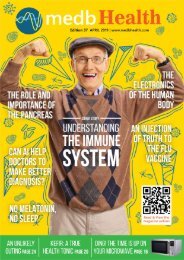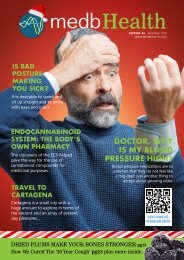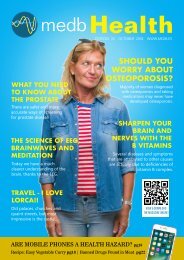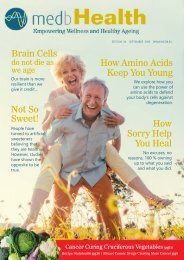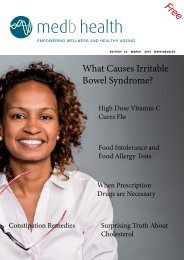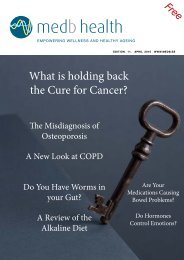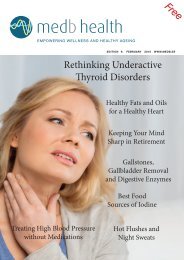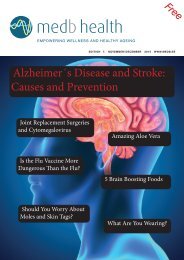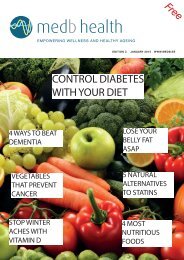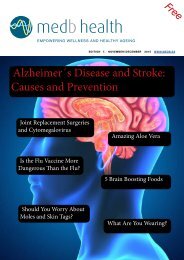Understanding Food Science and Nutrition
An understanding of Food and Nutrients will go a long way to help prevent diseases.
An understanding of Food and Nutrients will go a long way to help prevent diseases.
You also want an ePaper? Increase the reach of your titles
YUMPU automatically turns print PDFs into web optimized ePapers that Google loves.
found that people who consumed less than 3000<br />
mg of salt daily (lower than the recommended 3500<br />
mg daily) had a 27% higher risk of dying from a<br />
serious condition such as a heart attack or stroke.<br />
Other studies have found no improvement in blood<br />
pressure in people who eliminate salt from their<br />
diet. Instead, these studies reveal a plethora of<br />
health problems that occur when people avoid salt,<br />
from heart diseases <strong>and</strong> hormonal problems to<br />
digestive problems. Of course with everything in<br />
life, salt should be taken in moderation.<br />
What else is in Milk?: A disturbing reality today<br />
is that milk is promoted as a great source of calcium<br />
<strong>and</strong> a much-needed food for preventing <strong>and</strong><br />
treating bone <strong>and</strong> joint diseases. Nothing can be<br />
further from the truth. Although milk contains<br />
high amounts of calcium, that calcium is not<br />
available for use by our bones. Before calcium is<br />
absorbed, the bones require an equal amount of<br />
magnesium. But milk contains a lot of calcium but<br />
very little magnesium, making milk a poor source<br />
of calcium. To make matters worse, the calcium in<br />
milk binds to many minerals in foods, preventing<br />
their proper absorption.<br />
Milk is acidic <strong>and</strong> increases the acidity of the body.<br />
High acidity of the body encourages chronic<br />
inflammation <strong>and</strong> diseases. An Alkaline body<br />
promotes health.<br />
Milk consumed today also contains antibiotics<br />
<strong>and</strong> hormones injected into cows to increase milk<br />
production <strong>and</strong> prevent infections. However drugs<br />
given to pregnant animals filter into their milk,<br />
<strong>and</strong> it is for this reason that nursing mothers are<br />
advised to avoid medications. Milk promotes mucus<br />
production in the lungs, <strong>and</strong> intestines <strong>and</strong> should<br />
be avoided by those suffering from allergic illnesses<br />
such as asthma <strong>and</strong> digestive disorders.<br />
Most milk especially UHT or long life milk is<br />
irradiated milk, <strong>and</strong> irradiated food contains no<br />
living enzymes. Many people have argued that adult<br />
humans are the only adult animals on earth that<br />
consume milk, suggesting that milk is no food for<br />
adults. Rice milk, Almond milk <strong>and</strong> Coconut milk<br />
are suitable alternatives.<br />
Why Wheat is bad for you: The wheat eaten today<br />
is a genetically modified form of wheat, completely<br />
different from the original wheat that has existed<br />
for centuries. In the mid-1970s wheat was<br />
genetically modified to improve its yield <strong>and</strong> boost<br />
food supplies. The process was successful, but the<br />
resulting crop had extremely high levels of the<br />
toxins that naturally occur in wheat. Most grains<br />
such as wheat <strong>and</strong> corn contain toxins, but at levels<br />
that the body can tolerate.<br />
Studies show that since the mid-1970s when wheat<br />
was genetically modified, the incidence of many<br />
chronic illnesses, especially Diabetes <strong>and</strong> heart<br />
disease, has increased disproportionately compared<br />
to previous years. Coeliac disease, diverticulitis,<br />
diabetes, weight gain, strokes <strong>and</strong> heart attacks are<br />
all directly linked to a diet rich in wheat.<br />
<strong>Food</strong>s prepared from wheat dramatically increases<br />
sugar levels. Two slices of white or brown bread<br />
increase blood sugar level more than six teaspoons<br />
of sugar. The alternative to wheat <strong>and</strong> wheat based<br />
foods are rye, corn, rice, oats <strong>and</strong> porridge. The<br />
original form of wheat is still available <strong>and</strong> is called<br />
Spelt Wheat.<br />
According to Studies published<br />
in the Journal of Agricultural<br />
<strong>and</strong> <strong>Food</strong> Chemistry, A single<br />
glass of milk can contain up to 20<br />
different drugs including Antiinflammatory<br />
drugs – Diclofenac,<br />
Naproxen, <strong>and</strong> ketoprofen.<br />
Reasearchers from<br />
Greeninfo.com have<br />
identified over 200<br />
health conditions <strong>and</strong><br />
adverse health effects<br />
associated with wheat<br />
consumption.<br />
6 www.medb.es<br />
MedB_Mag_Vol8.indd 6 11/01/2016 14:15:26




